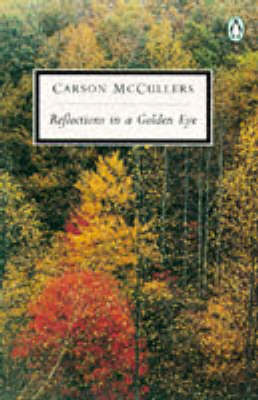Reviewed by brokentune on
2016 has been such a strange year so far. Not only have we lost some of the great individuals of the performance arts, but my reading choices have led me sown some rabbit holes that can only be described as "messed up".
Reflections in a Golden Eye is another one of those messed up books. Don't get me wrong, there is no gore or torture or anything like that, but we get a cast of characters who are each in a state of torment - each for different reasons but all of them are connected and could be resolved if things were brought out in the open.
Except, this does not happen. There are attempts, but these are consistently thwarted.
I recently described this story to a friend as similar to Albee's famous opus Who's Afraid of Virginia Woolf? except that there is no fight, no catharsis.
What is striking about Reflections, however, is that this was written in 1939 (the same year as The Heart is a Lonely Hunter), just over 20 years before Albee's play, and that Carson McCullers was only 22 years old at the time.
I'm am amazed at the insight McCullers had into the human psyche and into the complexity of relationships at such a (still) young age, and this is why I keep coming back to her writing. Stylistically, I did not enjoy Reflections as much as The Heart is a Lonely Hunter and I had to re-read several pages over and over to keep up with the story, but the ideas put forward in this short novella make it well worth reading.
" ‘You mean,’ Captain Penderton said, ‘that any fulfilment obtained at the expense of normalcy is wrong, and should not be allowed to bring happiness. In short, it is better, because it is morally honourable, for the square peg to keep scraping about the round hole rather than to discover and use the unorthodox square that would fit it?’
‘Why, you put it exactly right,’ the Major said. ‘Don’t you agree with me?’
‘No,’ said the Captain, after a short pause.
With gruesome vividness the Captain suddenly looked into his soul and saw himself. For once he did not see himself as others saw him; there came to him a distorted doll-like image, mean of countenance and grotesque in form. The Captain dwelt on this vision without compassion. He accepted it with neither alteration nor excuse.
‘I don’t agree,’ he repeated absently.
Major Langdon thought over this unexpected reply, but did not continue the conversation. He always found it difficult to follow up any one line of thought beyond the first, bare exposition. With a headshake he returned to his own bewildering affairs."
Reading updates
- Started reading
- 26 March, 2016: Finished reading
- 26 March, 2016: Reviewed
